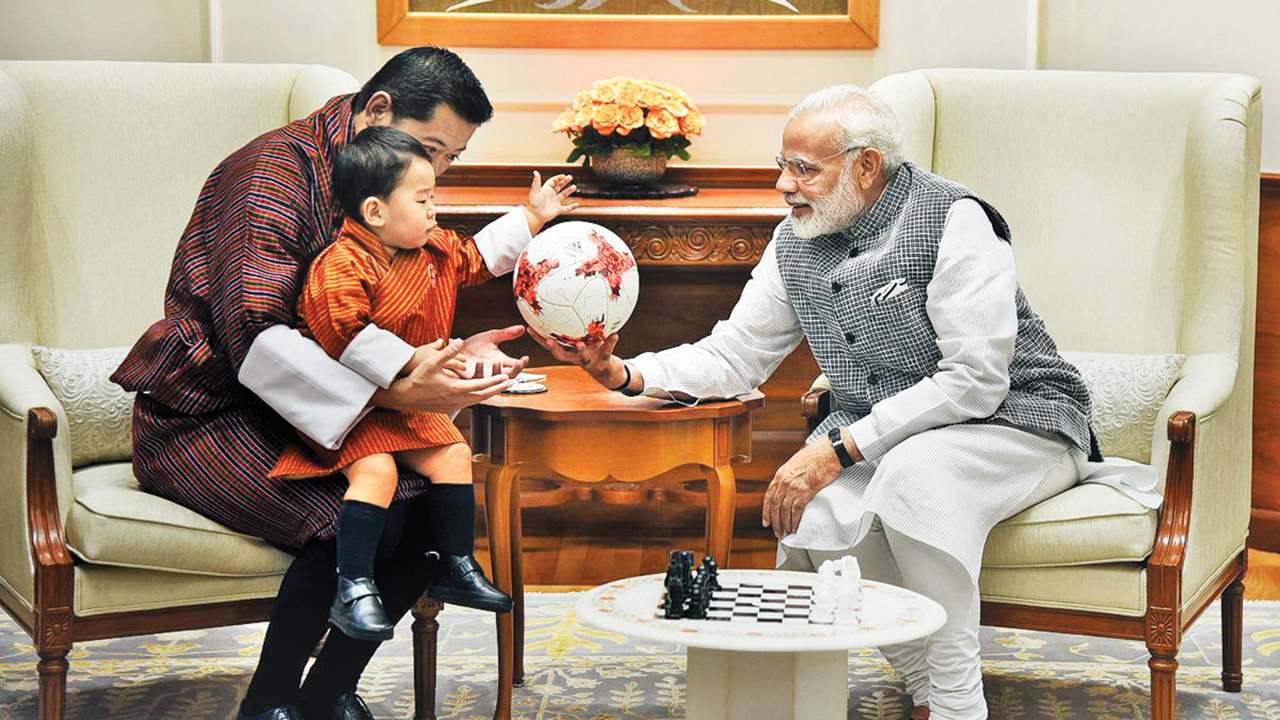
Recently in Kathmandu, Nepali journalists were saying that Prime Minister Narendra Modi would shortly visit Bhutan. Defence Minister Nirmala Sitharaman then stated in Parliament in a written reply to a question that the PLA has built infrastructure near a face-off site at Doklam. This was the first time helipads, military fortifications and PLA were deployed in North Doklam on Bhutanese land.
China has consistently maintained that Doklam is Chinese territory even as it offered Bhutan a package deal exchanging 269 sq km of territory for 89 sq km of Doklam, so critical is this piece of real estate. In this regard, China and Bhutan have had 24 rounds of border talks but have no diplomatic relations. Meanwhile, India and China made unusually conciliatory statements to reset relations.
India and Bhutan’s case at Doklam would have been optically much stronger had some soldiers of the 8000-strong Royal Bhutan Army, few located at nearby Jampheri post also joined Indian troops in jostling with PLA and stayed there. The mutual defence arrangement would have stood out starkly: so would have the linkage in the resolution of their respective border disputes with China.
On November 30, last year shortly after the Doklam disengagement, this newspaper covered the visit of the royals of Bhutan pictorially. The four pictures of K 5 (King 5) Jigme Khesar Namgyal Wangchuck and Princess Jetsum Pema Wangchuck meeting separately with President RN Kovind, Prime Minister Modi, Foreign Minister Sushma Swaraj and Defence Minister Nirmala Sitharaman are conspicuous by the spotlight on the accompanying one and half year-old heir apparent, the Crown Prince. India’s relations with the Wangchuck Royal family are vitally important especially after the fait accompli China attempted to present at Doklam aimed at de-coupling India and Bhutan. President Kovind conveyed ‘deep appreciation for the King of Bhutan’s personal involvement and guidance and support provided by Bhutan in addressing the recent situation in Doklam’.
Although Bhutan is a constitutional monarchy the King is the symbol of national unity and of its people. He is still the real power though the optics might belie this impression. Elections to Parliament are to be held later this year.
Bhutan and India have signed a Treaty of Perpetual Peace and Friendship in 1949 which was unilaterally changed by India in 2007 to give greater strategic autonomy to Bhutan in managing its external relations. Article 2 of the Treaty is the key and says both countries will cooperate closely on issues relating to national interest. Neither country will allow use of its territories harmful to the national security and interest of the other. What the Treaty does not say but is part of an understanding is that India will be responsible for the defence of Bhutan. The face-off at Doklam is inextricably linked to Article 2 of the Treaty. This understanding allows the deployment of an Indian military team in Ha in West Bhutan as well as deployment of Indian Army units earmarked to assist the RBA in the defence of Bhutan. The presence of Indian Army units in Bhutan has been both an irritant and an embarrassment for the government and gentry of Bhutan because the Defence Cooperation Agreement is under wraps.
The Indian Dantak border road building force in Bhutan since 1961 has provided connectivity and lost 100 men in the process. K4 (King 4) Jigme Singhye Wangchuck would openly say that he has put all his eggs in India’s basket and Bhutan is part of the Indian security system.
While India pushed for democracy and a constitutional monarchy in Nepal, in Bhutan K4 saw the writing on the wall, compressed the democratic process in five years and abdicated. Incidentally there is no defence minister in Bhutan as the King is responsible for the defence and security of the Kingdom. The closed Kingdom gradually opened up with Internet, TV, media and an increase of tourists. While Bhutan joined the UN in 1970 it established diplomatic relations with some 53 countries – none of the P5 including China. There was a minor political upheaval in 2012 on account of Prime Minister Jigme Thinley bypassing the King in attempting to establish diplomatic relations with China. For the first time there was mild public criticism of India and the question raised ‘why do we have to be guided by India’? More questions were asked during the Doklam crisis but it can be said with certainty that Bhutanese will never go against India and its national interest.
In his book, China’s India War: Collision Course on the Roof of the World, Bertil Lintner says Bhutan cannot antagonise China, its powerful northern neighbour. He writes that on 1 August 2017 during the Doklam crisis, Bhutan’s Ambassador to India Gen Vetsup Namgyel attended the 90th anniversary function of the PLA at the Chinese Embassy in New Delhi. It should be seen as a subtle signal of Bhutanese goodwill towards China.
Last month, Prime Minister Tshering Tobsay was the chief guest at a maiden global investor summit Advantage Assam which Modi inaugurated. Bhutan has opened its second consulate in India after Kolkata at Guwahati in sync with India’s Act East policy which focuses on India’s North East. Bhutan, like Nepal where monarchy has been dismantled is stuck between two powerful neighbours who have bitter rivalries and unsettled borders.
Bhutan will not go the Nepal way as long as the Wangchuck dynasty is around. The Chinese need to understand this before trying to rekindle Doklam by devious means. Sitharaman’s optimism about China’s good behaviour is misplaced as it is difficult to trust Xi Jinping’s New China. In fact, a visit by Prime Minister Modi to Bhutan shortly, as is being speculated in Kathmandu, would be very welcome post-Doklam.
The author is a retired Maj Gen and a defence and strategic affairs expert. Views are personal